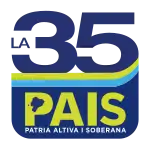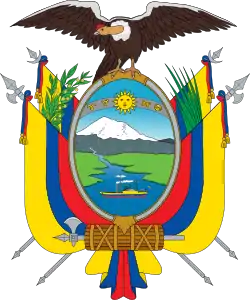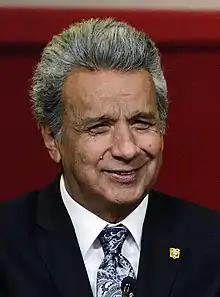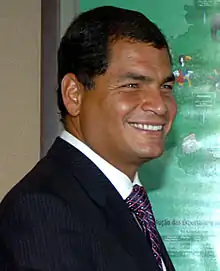PAIS Alliance
The PAIS Alliance (Spanish: Alianza PAIS (Patria Altiva i Soberana); English: PAIS Alliance (Proud and Sovereign Homeland); país also means "country" in Spanish) is an Ecuadorian social democratic political party.
PAIS Alliance Movement (Proud and Sovereign Homeland) Movimiento Alianza PAIS (Patria Altiva i Soberana) | |
|---|---|
 | |
| President | Lenín Moreno |
| Secretary-General | Gustavo Baroja |
| Founded | April 3, 2006[1] |
| Preceded by | Movimiento Pais Ruptura de los 25 Poder Ciudadano Alianza Bolivariana Alfarista Amauta Jatari Poder Ciudadano PCE |
| Headquarters | Av. Shiris, Quito, Ecuador |
| Newspaper | Somos PAIS |
| Youth wing | Juventudes Alianza Pais |
| Membership | 979.691 (2016) [2] |
| Ideology | Current: Social democracy[3][4][5][6][7] Correa era: Socialism of the 21st century Bolivarianism Democratic socialism[8] Left-wing populism Left-wing nationalism Correism |
| Political position | Current: Centre[9][10] to centre-left[11][12] Correa era: Left-wing |
| National affiliation | United Front (2014-2018) |
| Regional affiliation | COPPPAL Foro de São Paulo |
| Colors | Lime green (customary) Midnight blue Bitter lemon |
| Seats in the National Assembly | 40 / 137 |
| Prefectures | 0 / 23 |
| Municipality | 27 / 221 |
| Website | |
| www | |
Background
 |
|---|
| This article is part of a series on the politics and government of Ecuador |
|
|
The roots of the PAIS Alliance go back to 1999, when Ricardo Patiño urged, together with Alberto Acosta, Patricia Dávila, Ivonne Benítez and other Ecuadorian politicians, the creation of Jubilee 2000 Net Guayaquil, a civil corporation that would investigate ways to solve the serious issue of the Ecuadorian foreign debt, which had risen to a historical high.[13] Rafael Correa, Gustavo Larrea and Fander Falconí also joined the group. Alliance PAIS influenced many successive political movements, giving its structure to movements like Civic Initiative, National Democratic Action, Alliance Bolivariana Alfarista, and Jubilee 2000.[14]
The PAIS Alliance movement functions under the Ecuadorian Socialist Party, sharing humanist movements and social bases.[14]
Main members of the party


The president of the modern day party is Lenín Moreno, who is also the current President of Ecuador. Other important leaders include former president Rafael Correa, President of the National Assembly Fernando Cordero Cueva, the former Alcalde of Quito Augusto Barrera Guarderas, the assemblyman Fernando Bustamante, Aminta Buenaño, the ex-Secretary of Planning Fander Falconí, and the Chancellor of the Republic Ricardo Patiño.[15][16]
National directive
The 22 vocales, or speakers, of the National Directive are Ricardo Patiño, Doris Soliz, Augusto Barrera, Irina Cabezas, Fernando Cordero, Nancy Morocho, Fander Falconí, María Luisa Moreno, Roberto Cuero, Ximena Ponce, Juan Carlos, Roxana Alvarado, Miguel Carvajal, Dora Aguirre, Jorge Loor, Gabriela Rivadeneira, Diego Borja, Patricia Sarzoza, Gustavo Baroja, Andrea Gonzaga, Leonardo Vicuña and Olguita Mejía.
Members of the Commission of Ethics include Karla Chávez, Carlos Marx and Galo Borja.
Members of the Electoral Commission include Mayerli Vásquez, Paúl Granda and Xavier Ponce.[17]
PAIS Alliance publishes the newspaper El Ciudadano. The young wing of the AP is called the Juventudes Alianza País.[18]
History
First period
PAIS ("Proud and Sovereign Fatherland Alliance") was officially founded by Rafael Correa at the start of 2006 Presidential campaign. Originally espousing democratic socialist views,[8] the movement called for political sovereignty, regional integration, and economic relief for Ecuador's poor.[19]
During the campaign, Correa proposed a constituent assembly to rewrite Ecuador's constitution.[20] PAIS Alliance did not run any congressional candidates, as Correa had stated that he would call for a referendum to begin drafting a new constitution. However, the PAIS Alliance movement signed a political alliance with the Ecuadorian Socialist Party, which did present candidates for Congress.[21]
In the 15 October 2006 general election Correa came in second place (22.84%), behind banana tycoon Álvaro Noboa (26.83%). Correa won the subsequent 26 November 2006 runoff election with 56.67% of the vote.[22] He took office on 15 January 2007.
Constituent referendum
On 15 April 2007, Ecuadoreans voted overwhelmingly (81.72% in favor) to support the election of a constituent assembly.[23]
Constituent Assembly election
In the national election, President Correa won backing for his plans to rewrite Ecuador's constitution and expand state control of the nation's economy. Correa's faction also won approximately 61% of the seats in the National Assembly (80 of 130 Assembly Members).[24] The Constituent Assembly was originally led by PAIS Alliance member Alberto Acosta, who was soon replaced by another PAIS member, Fernando Cordero.
Constitutional referendum
A constitutional referendum was held in Ecuador on 28 September 2008 to vote on the constitution drafted by the 2007 Ecuadorian Constituent Assembly.[25] Partial results show that 64% of voters voted to approve the 2008 Constitution of Ecuador.[26]
Primary elections
For the first time in the political history of Ecuador, an organized political party selected its candidates by means of primary elections. PAIS Alliance organized primary elections for January 25, 2009, in the whole country. The objective was that the members of the political movement would name the candidates for the elections of April 26, 2009.[27]
General elections
Rafael Correa was re-elected for a second term in the general election on 26 April 2009. It was the first time in thirty years that the country had re-elected a president. PAIS also won the largest legislative block in the National Assembly, although not a majority.[28][29]
In the elections for the Andean parliament, Alliance PAIS obtained 3 of 5 parliamentarians.[30][31][32]
Rafael Correa was ratified as president of the movement in November 2010. Galo Mora was designated as the first secretary-general.[33]
On 1 October 2016, former Vice President Lenin Moreno was nominated as a candidate for the 2017 presidential election at the conference of País Alliance. The statement was made by President Rafael Correa.
In the 19 February 2017 election, Moreno won the elections with 39.3% of the vote. However he was short by less than one percentage point of outright victory, as Ecuador requires in its two-round system.[34] He defeated Guillermo Lasso in the 2 April 2017 second runoff with 51.16% of the vote.[35]
Moreno administration
Within months of winning the election, Moreno moved away from his voting platform,[3] igniting a feud with ex-president Rafael Correa. Moreno distanced himself from populist policies championed by Correa and the Venezuelan government, arguing that Ecuador needed to be independent from ALBA.[36] Moreno continued to identify himself as social democrat throughout this process.[12]
In February 2018, Moreno led the 2018 Ecuadorian referendum and popular consultation, which proposed more strict corruption laws and more regulations to protect natural areas within the country.[37] The most significant proposal approved by Ecuadorians in the referendum was the re-establishment of term limits for the presidency, effectively blocking Correa's future electoral bids.[12] At the time, Moreno enjoyed an approval rating near 80 percent according to polls.[12]
Under Correa, the Ecuadorian government had begun to overspend and increase borrowing, with the country's debt tripling in a five-year period.[3] Moreno was tasked with overhauling Ecuador's economy, resulting in spending cuts.[3] The moves to reverse Correa's populist policies did not earn Moreno more popular support, however, and by April 2019 his approval rating had dropped to around 30 percent.[3][12] By early 2020, his popularity had tanked to 7,72%.[38]
Political project
As of 2016, PAIS has an approximate membership of 979,691 people.[39]
PAIS Alliance occupies the slot of party number 35 on the Ecuadorian ballot. The colors of PAIS Alliance are bitter lemon and midnight blue. The slogan for the 2007 elections "Dale Patria" translates to "Go Fatherland" in English.
Electoral history
Presidential Elections
| Election | Party candidate | Votes | % | Votes | % | Result |
|---|---|---|---|---|---|---|
| First Round | Second Round | |||||
| 2006 | Rafael Correa | 1,246,333 | 22.84% | 3,517,635 | 56.67% | Elected |
| 2009 | 3,584,236 | 51.99% | Elected | |||
| 2013 | 4,918,482 | 57.17% | Elected | |||
| 2017 | Lenín Moreno | 3,716,343 | 39.36% | 5,062,018 | 51.16% | Elected |
National Assembly elections
| Election | Party leader | Seats | +/– |
|---|---|---|---|
| 2006 | Rafael Correa | 0 / 100 |
|
| 2007 | 80 / 130 |
||
| 2009 | 59 / 124 |
||
| 2013 | 100 / 137 |
||
| 2017 | Lenín Moreno | 74 / 137 |
Notes
The party did not participate in the 2006 election.
References
- "Conozca la historia de Alianza PAIS, de un binomio al control del poder en Ecuador".
- https://www.eltelegrafo.com.ec/noticias/politiko/1/la-cc-aun-no-tramita-el-pedido-de-aclaracion-por-supuesta-estafa
- "Lenín Moreno's new economic policy". The Economist. 2019-04-11. ISSN 0013-0613. Retrieved 2019-10-11.
- "Ecuador paralyzed by national strike as Moreno refuses to step down". The Guardian.
- "Moreno Is Breaking Ranks with the Correa Administration". Fair Observer. Sep 10, 2018. Retrieved 9 October 2019.
- "The Socialist Who Gave Up Julian Assange and Renounced Socialism". Bloomberg.
- "Lenín Moreno unpicks Ecuador's leftwing legacy". The Financial Times. Retrieved 9 October 2019.
- Ortiz-T., Pablo (2008), "Ecuador", The Indigenous World 2008, International Work Group for Indigenous Affairs, p. 147
- https://www.heritage.org/international-economies/commentary/can-ecuador-continue-gain-economic-freedom
- https://www.reuters.com/article/us-ecuador-protests/ecuador-unions-call-off-anti-austerity-protests-after-370-arrests-in-two-days-idUSKBN1WJ1FI
- "Lenin Moreno: It is necessary to establish a new ideology". Al Jazeera. 3 January 2019.
- Stuenkel, Oliver (2019-07-11). "Is Ecuador a Model for Post-Populist Democratic Recovery?". Carnegie Endowment for International Peace. Archived from the original on 2019-07-12. Retrieved 2019-10-11.
- Salmon, Felix (2011-07-05). "How Ecuador sold itself to China". Reuters Blogs. Retrieved 2021-01-05.
- "Elected Left, Governing Right". NACLA. Retrieved 2020-12-19.
- Rogtayuk, Denis. "Ecuador's Neoliberal Government Is Trying to Ban Rafael Correa from the 2021 Elections". Jacobin Mag.
- "Bribery trial begins against ex-Ecuador leader Rafael Correa". AP NEWS. 2020-02-10. Retrieved 2020-12-19.
- "Movimientoalianzapais - Mein Blog". movimientoalianzapais.com.ec. Archived from the original on 2011-08-22. Retrieved 2011-05-07.
- http://www.oromartv.com/Noticias-Nacionales/Juventudes-Alianza-PAIS.html%5B%5D
- ‘Socialismo’ en el discurso de Correa Archived 2009-01-09 at the Wayback Machine El Universo, July 23, 2007
- McDermott, Jeremy Man of the people closes in on presidency Archived 2007-03-12 at the Wayback Machine, The Scotsman, 14 October 2006.
- (in Spanish) Alianza PAIS and Socialist Party sign alliance on Alianza PAIS website Archived 2009-11-18 at the Wayback Machine
- (in Spanish) RESULTADOS: NACIONALES Tribunal Supremo Electoral
- "Consulta Popular Nacional" (in Spanish). 2007-06-30. Retrieved 2017-06-05.
- Correa Wins Majority in Ecuador Vote to Rewrite Constitution, Bloomberg News, 2 October 2007.
- "Ecuador Assembly Approves Constitution - Prensa Latina".
- "Ecuadoreans back new constitution". BBC News. 29 September 2008.
- Reglamento: Elecciones Primarias 2009 Archived 2009-02-25 at the Wayback Machine Acuerdo PAIS
- "Avenger against oligarchy" wins in Ecuador The Real News, April 27, 2009.
- "PAIS, sin mayoría tras definirse los 124 escaños". 23 June 2009.
- (in Spanish) http://www.hoy.com.ec/noticias-ecuador/ecuatorianos-designan-parlamentarios-andinos-en-apaticas-elecciones-353279.html Archived 2011-12-17 at the Wayback Machine
- (in Spanish) http://www.eltiempo.com.ec/noticias-cuenca/18482-pais-encabezara-representantes-de-ecuador-en-parlamento-andino/ Archived 2011-10-06 at the Wayback Machine
- (in Spanish) http://www.hoy.com.ec/noticias-ecuador/movimiento-pais-alcanza-tres-de-las-cinco-curules-en-el-parlamento-andino-353424.html Archived 2011-04-30 at the Wayback Machine
- (in Spanish) http://ec.globedia.com/ratifica-convencion-alianza-pais-liderazgo-presidente-correa
- In the Ecuadorian system, to avoid a runoff a candidate needs to either win 50 percent of the first-round vote, or take 40 percent of the vote and be at least 10 percent ahead of the runner-up (Guillermo Lasso had obtained 28.09%; so had Moreno gained 40 percent he would have won on the 40-10 rule).
- "CNE informa "resultados irreversibles": Moreno 51.16% – Lasso 48.84%" (in Spanish). Ecuavisa. 4 April 2017. Retrieved 28 April 2017.
- "Ecuador leaves Venezuelan-run regional alliance". Associated Press. 24 August 2018. Archived from the original on 24 August 2018. Retrieved 9 October 2019.
- "¿Cuáles son las siete preguntas del referéndum y la consulta popular del 4 de febrero del 2018 en Ecuador?". El Comercio (in Spanish). Retrieved 2018-08-01.
- "Encuestadora: la popularidad de Lenín Moreno toca fondo". www.expreso.ec. Retrieved 2021-01-30.
- https://www.eltelegrafo.com.ec/noticias/politiko/1/la-cc-aun-no-tramita-el-pedido-de-aclaracion-por-supuesta-estafa
External links
- Official PAIS Alliance website (in Spanish)
- Official website of the Correa presidency (in Spanish)